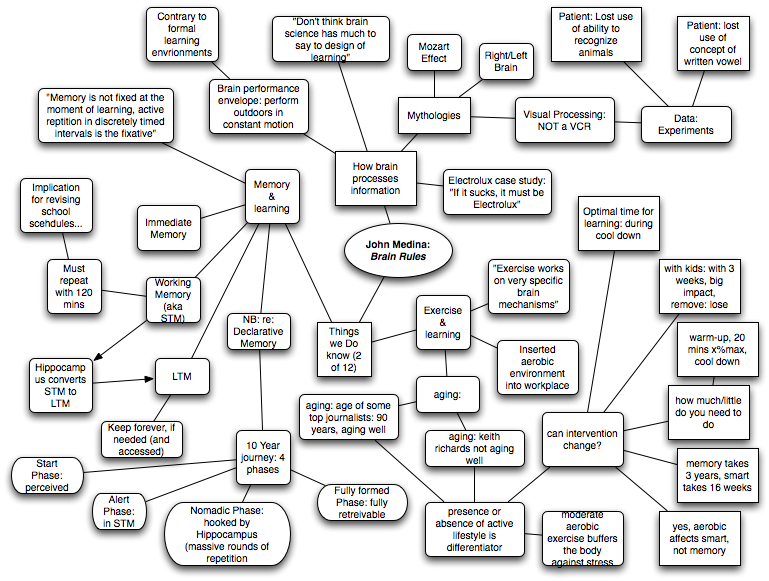John Medina gave the closing keynote at DevLearn, based upon his book Brain Rules. He covered two of his 12 rules, on memory, and on exercise. He spoke fast, was enthusiastic, funny, and knowledgeable. He talked about myths of learning, and said that he didn’t think there was a lot neuroscience had to say to learning design (thankfully, cf Willingham).
One of his points was that our brains evolved to provide ongoing performance guidance over hours of constant motion (evolutionarily). This leads to implications that are contrary to most of our learning contexts!
His first rule was about memory, and he covered the basic model of cognitive models of memory, but then pointed out that it’s about 10 years from initial exposure to fixed memory, and requires extensive repetition. During that period, distortion can occur. This explains the rule of thumb that you have to be doing something for 10 years before you can be considered an expert. It probably takes 10 years of doing things before they’re solidified in useful experience to apply.
The second rule he covered was the relation between exercise and learning. It was really exercise and thinking, and there’s a positive relationship. The difference between sedentary and moderately active lifestyles is big in terms of mental acuity. And reintroducing it for a reasonably short period (16 weeks) can reignite. Memory improvements take longer, like 3 years. It works for kids too, and if they stop, it drops off.
He made several observations how revising schools would work better, sadly too true. So, repeat if you need it to stick (a great opportunity for mobile learning), and do get exercise for your own health, and maybe have an organizational incentive as well! Here’s my concept map (it was hard as quick as he spoke, so didn’t get all the data):

Thanks, Clark. Really wish I could have been there.
I’m most intrigued by this statement: “…said that he didn’t think there was a lot neuroscience had to say to learning design.”
Out of context, I am having a hard time understanding what is meant or implied. If neuroscience has something to say about learning (point # 1), then it obviously would have equal applicabilitiy to learning design (point # 1.1) just by virtue of the info hierarchy. Maybe he means that neuroscience has nothing dogmatically prescriptive to say about learning design? (See my struggle?) Can you help unpack this a bit?
Eric, I think he meant that the implications (cf Willingham) are at the wrong level of description for application in design. He had some implications, but repetition for 10 years to stick doesn’t give us a very practical handle. I think educational research (cf. Clark, Thalheimer, myself) is a far better guide. That help?
Thanks for the lovely mind map, Clark!
I WISH I could have been there. If his DVD is any indication, Dr. Medina is a VERY funny man.
I find myself thinking a lot about his memory chapter, and how it applies to what I do in the classroom. Specifically, how it seems that after a great two weeks in the classroom, after 5 days of practical application, my trainees have abandoned everything they have been taught, and are “selling on instinct” rather than technique.
I know part of the answer is in the book, but I’m still drilling.
Great post. As a non medical but very interested and physically active member of my community. How many more revelations do we need before there is a full and adequate recognition at societal and medical profesional levels of the critical role that continuing exercise plays in almost all areas of physical and cognitive functioning.
It seems that we say and say again how important is the role of exercise yet in practical terms at the great societal levels [dare i say at many professional levels across the mediacla fraternity] we see little evidence of meaningful, powerful life changing messages coming out such that society takes a different path!
We are so focused at the level of the detail of our concerns its as if we fail tosee the greater good that could be attained if in meaningful ways we really transformed society’s attitude to exercise….. or is there some form of politically correct issue here that is arising that profesionals don’t want to get involved in?
Here are 20 interviews with medical Practioners some of which may be of interest to your readers as they build on your content and contain much that is inciteful and of interest.